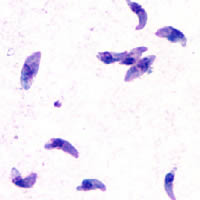
Photo from wikipedia
The present study aimed to use the loop-mediated isothermal amplification (LAMP) technique in comparison with serological tests to determine the rate of T. gondii infection in women suffering from spontaneous… Click to show full abstract
The present study aimed to use the loop-mediated isothermal amplification (LAMP) technique in comparison with serological tests to determine the rate of T. gondii infection in women suffering from spontaneous abortion (SA). A total of 140 women suffering from their first SA were included in this study. The collected aborted fetal remains and blood samples from each patient were examined in sterilized conditions using the LAMP technique and ELISA. Of the 140 women, 80 (57.1%) tested seropositive for anti- Toxoplasma antibodies by ELISA, 72 (51.4%) women tested seropositive for the IgG antibody, 8 (5.7%) tested seropositive for the IgM antibody. Among the eight women who’d had their first SA who tested seropositive for IgM antibody by ELISA, only five cases (62.5%) reported positively to the LAMP test. The difference in the frequency distribution of the LAMP results for measuring the Toxoplasma infection in pregnant women under study was statistically significant ( P < 0.001) from the results of the serological test (ELISA). Although there was a significant difference between age and positivity in the LAMP test ( P = 0.017), no significant difference was observed between positivity in the LAMP test and other variables. The findings of the present investigation suggest that LAMP is a preferred method for determining Toxoplasma infection in pregnant women suffering from SA compared with other routine serological tests. Even in a field with limited facilities and equipment, this technique can be effective and efficient in accurately and specifically diagnosing Toxoplasma infections in women at high risk of SA.
Journal Title: Archives of Microbiology
Year Published: 2020
Link to full text (if available)
Share on Social Media: Sign Up to like & get
recommendations!